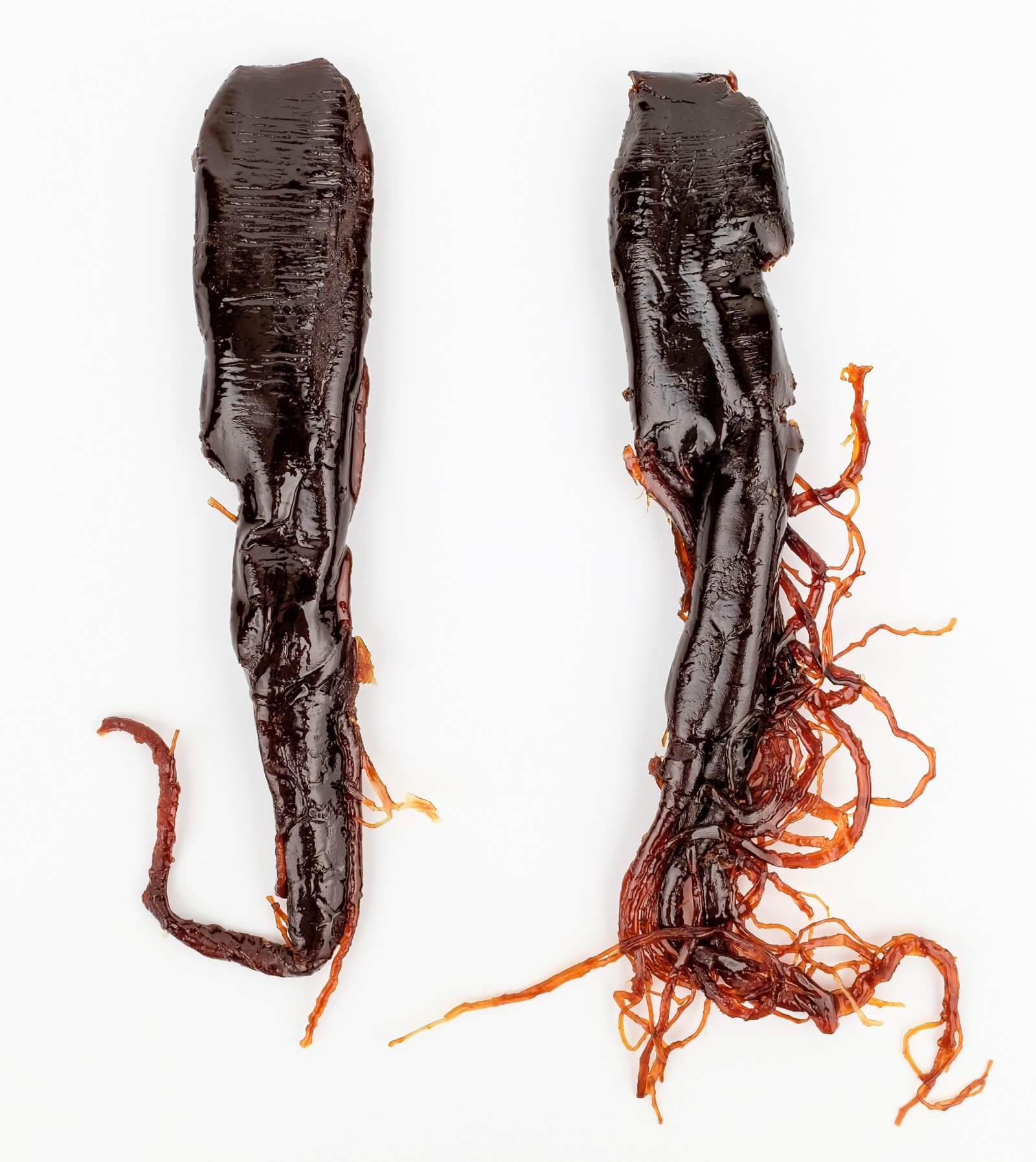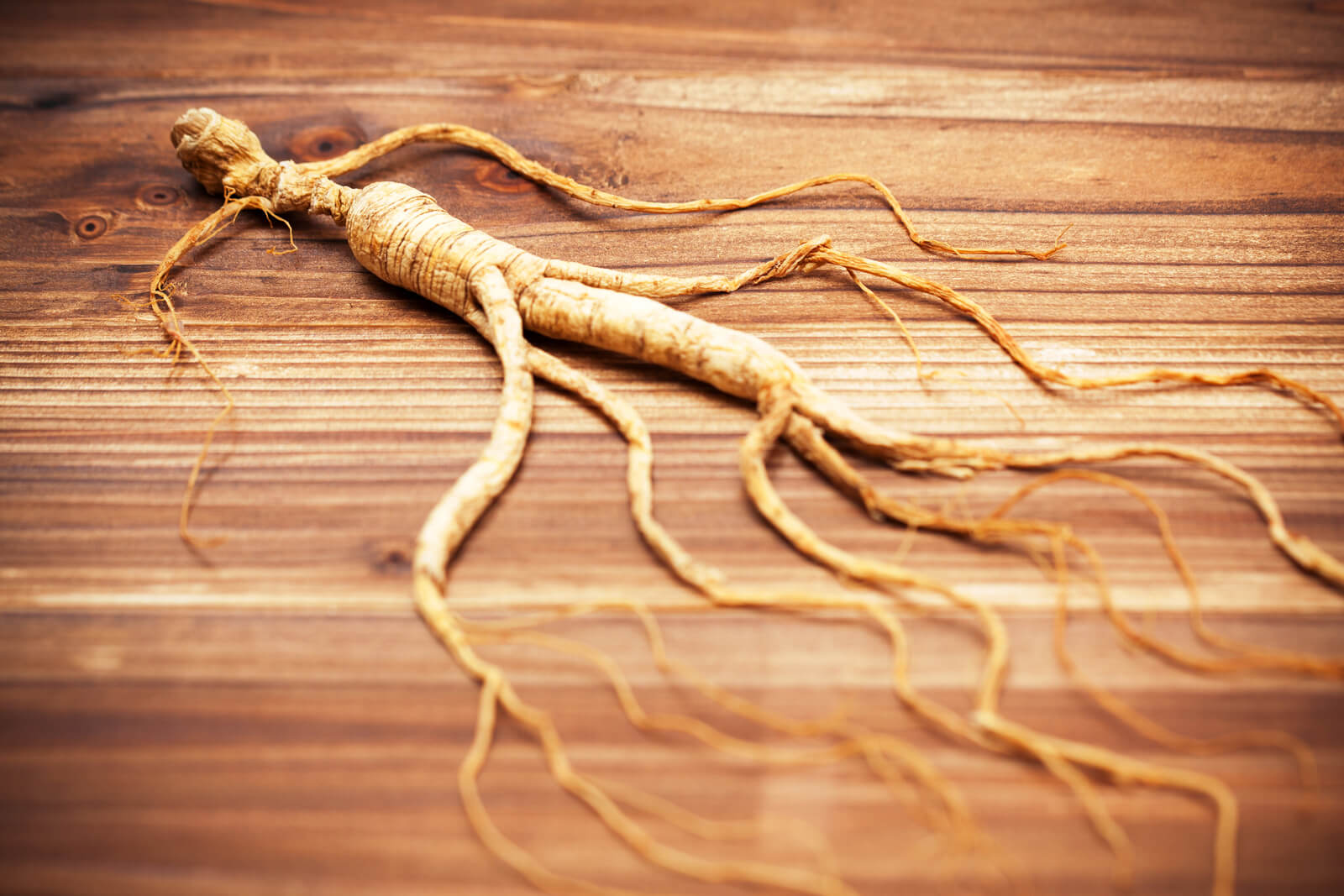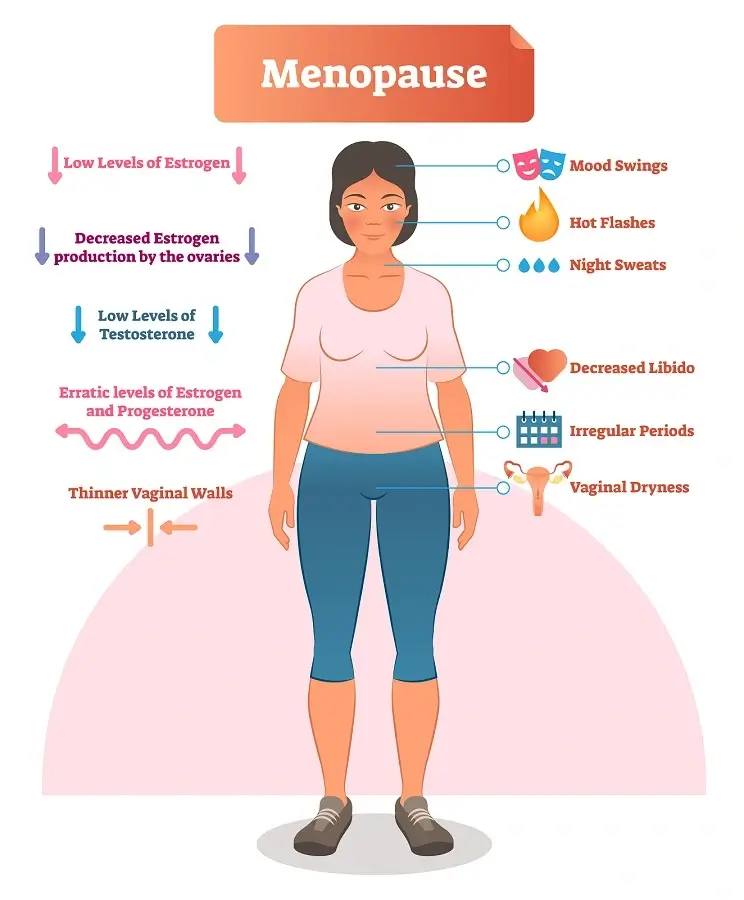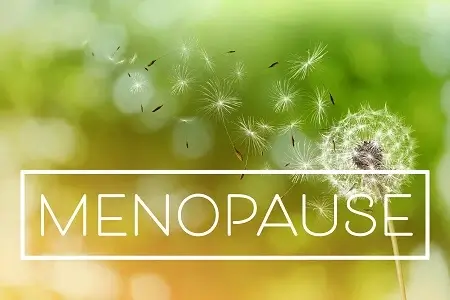
So, can ginseng (Panax ginseng) help with menopause in some way? Many studies appear to state it certainly can. But if you are new to researching ginseng, you may want to opt for red ginseng instead of regular ginseng; red ginseng is simply steamed regular ginseng.
The prominent expert on medicinal herbs, Dr. James Duke in his book The Green Pharmacy Herbal Handbook,(source 1) gives ginseng a safety rating of "safer than coffee." He states this herb has a wide range of therapeutic properties. Therefore, it may be good to take for more than just menopause; but it does do a great deal for ladies in this stage of their lives.
Summary of Benefits Red Ginseng Confers to Menopausal Women
- Can improve climacteric syndrome(source 9)(source 2)
- It can reduce hot flashes(source 2)
- Helps prevent cardiovascular disease(source 5)
- Lowers cholesterol(source 5)(source 12)
- Improves sexual function(source 8)
- Helps with fatigue(source 13)
- It may help with osteoarthritis(source 4)
- It may improve antioxidative activity(source 4)(source 13)
- It may relieve pain(source 4)
Echoing some of the aforementioned benefits is a 2022 review study in Complementary Therapies in Clinical Practice.(source 2) This review study searched for studies using ginseng to treat menopausal problems. A total of 15 studies met the author’s inclusion criteria.
This comprehensive review studies covers a lot of ground, and some of the studies we will investigate in more detail later on. But, essentially, the authors came to the following positive conclusions about ginseng:
- It can reduce hot flashes
- It can reduce menopausal symptoms
- It can improve quality of life
How to Take Ginseng for Menopause
The first thing that seems obvious in the research is a possible preponderance of use of "red" ginseng. Red ginseng is simply regular Asian ginseng (Panax ginseng) that has been steamed (using hot steam) for 2 to 3 hours.(source 6)
Red ginseng contains new ginsenosides (the major plant chemicals in ginseng) which are thought to have a more powerful medicinal effect than those in white ginseng.(source 4) Additionally, ginsenosides may have many benefits to the nervous system.(source 7)
Concerning dose, a 2022 study in the Journal of Ginseng Research(source 3) specifically looked at the safety of taking ginseng. The study confirmed it was safe to take a 2 g dose (which is 2,000 mg) of Korean red ginseng with a mixture of other herb extracts (containing a total of 1,500 mg red ginseng extract; taken as four 500 mg pills each having 375 mg red ginseng extract).
The 2022 review study in Complementary Therapies in Clinical Practice(source 2) looked at 15 studies. The doses of ginseng varied between studies, but given this comprehensive look at dosage levels, it would appear that a 3,000 mg daily dose is what is very common.
So, when it comes to taking ginseng, you should consider using a quality Korean/Asian red ginseng at a dose of 3,000 mg each day. Try taking it with meals and with plenty of water.
Naturally Defeat Menopause Symptoms
If you’ve tried everything, and seen the same old menopause advice; Ms. Julissa Clay, a university medical researcher, invested over 850 hours developing her own natural solution to menopausal symptoms. It works for about 95% of the women who try it.
Find out the unique way Ms. Clay freed herself from these symptoms; backed by a 60 day, 100% money back guarantee.

Research Evidence of Positive Results with Ginseng

A 2012 study in Menopause(source 5) found that ginseng does offer some help for menopause. The study involved 72 postmenopausal women aged 45 to 60 years, and was a randomized, placebo-controlled, double-blind clinical trial.
The women were randomly assigned to either receive red ginseng or placebo. Those taking red ginseng took 3 g (which is 3,000 mg) plus 60 mg of ginsenosides each day for 12 weeks.
The women were assessed for menopausal symptoms, cardiovascular risk factors, and blood estrogen levels for the 12 weeks they took the daily regimen.
The study found, with two different types of menopausal symptom assessments, both showed a reduction in menopausal symptoms for women taking the red ginseng. And, hot flash symptoms were also specifically reduced for women using the red ginseng.
The ginseng treatment used in the study also decreased total cholesterol low-density lipoprotein cholesterol (LDL), and reduced carotid intima-media thickness (measuring this helps physicians determine the health of the carotid arteries which are responsible for sending blood to your head and brain; a reduction is good, having a thickness over 1 mm can mean you are at risk for cardiovascular problems).
Concerning estrogen levels, there was no difference in blood estradiol (E2; a type of estrogen) levels in those taking red ginseng compared to placebo.
The study concluded with the following remarks:
Therefore, [red ginseng] could be an attractive herbal dietary supplement for the relief of menopausal symptoms and the prevention of [cardiovascular disease] especially for women who are unable to receive [hormone therapy] or for whom [hormone therapy] is not recommended.
Menopause [19.4 (2012): 461-466]
End Menopausal Weight Gain
Deborah Murtagh is an international weight loss coach, avid writer and researcher, and founder of several best-selling weight loss programs with thousands of clients in over 48 countries.
Learn Deborah’s ideal plan for losing weight during menopause from a woman who struggled her entire life with weight gain.
Ms. Murtagh’s program comes with a 60 day, 100% money back guarantee.

So what is Red Ginseng?
Red ginseng is produced from steaming raw, regular ginseng (Panax ginseng) for two to three hours at 98° to 100° celcius (100° C equals 212° F). On the other hand, white ginseng is simply air dried ginseng.
It has been reported that red ginseng has more medicinal value than white ginseng. The steaming process alters the phytochemicals (plant chemicals) and produces different ginsenosides (saponins in ginseng; which are the main plant chemical in this herb) that are not usually found in white ginseng. Although the amounts of these new ginsenosides are relatively low, they are known as ginsenosides Rg3, Rg5, Rg6, Rh2, Rh3, Rh4, Rs3, and F4.(source 6)
A 2018 study in BioMed Research International(source 7) looked at the medicinal value of ginsenosides; particularly for use with the nervous system. The study states:
Ginsenosides are the major constituents of ginseng. Ginsenosides have the unique biological activity and medicinal value, such as antitumor, anti-inflammatory, antioxidation, and inhibition of [normal and controlled cell death].
BioMed Research International 2018
This study states the following benefits of ginsenosides:
- They have an anti-epilepsy effect.
- Ginsenoside Rg3 had an anti-depression effect in mice by regulating corticosterone, adrenocorticotropic hormone, and noradrenaline.
- Ginsenoside Rd protects against cerebral ischemia (lack of blood supply).
- Ginsenoside Rg1 improved long-term memory in mice.
- Ginsenoside Rg1 might be a possible treatment for Parkinson’s disease.
Dr. John Herzog (MD)
Dr. John Herzog, a "survival surgeon" from Maine explains what home remedies work best in a crisis situation.
This may be important in the event you require first-aid or are in an emergency situation without easy access to a hospital. Dr. John Herzog has assembled a large collection of home remedies for such scenarios.

More Research Supporting Ginseng for Menopause

But, this study used a dose of 6 grams of ginseng given orally each day for 30 days. And, as Dr. James Duke stated, the herb is even safer to use than coffee.
A 2010 study in the The Journal of Sexual Medicine(source 8) investigated how ginseng would affect menopausal women’s sexual function. The study involved 28 women with an average age of 51.2 years. The women took either placebo or 3 g of Korean red ginseng on a daily basis.
The study found that the Korean red ginseng improved sexual function in menopausal women, and such extracts were suggested to be used by women to improve their sexual function.
A 1999 study in the International Journal of Gynecology & Obstetrics(source 9) looked at how Korean red ginseng would impact postmenopausal women suffering from severe climacteric syndromes.
The study involved 20 postmenopausal women; 8 without climacteric syndrome (symptoms caused by lowered ovarian hormone levels; i.e., hot flushes, bad sleep, pain, mood problems) and 12 with climacteric syndromes. The women who had climacteric syndrome took 6 g of Korean red ginseng orally every day for 30 days.
The study determined the women’s Dehydroepiandrosterone (DHEA), cortisol, and adrenocorticotropic hormone (ACTH) levels before and after thirty days for the women taking Korean red ginseng.
DHEA is important in menopause because it is a precursor to estrogen, androgens (male sex hormones), and sex steroids. DHEA and its sulfate (DHEA-S) are responsible for about 75% of the estrogen created in premenopausal women and about 50% of androgens in men. After menopause DHEA and DHEA-S are still used to produce estrogens and androgens.(source 10)
ACTH is a hormone made by the pituitary gland (a small gland in the brain) that controls the production of cortisol. Cortisol is the primary stress hormone, and as a medication it is known as hydrocortisone. Cortisol helps you respond to stress, regulates blood sugar, fights infection, maintains blood pressure, and regulates metabolism.(source 11)
The study found that the blood levels of DHEA-S were significantly different between women with and those without climacteric syndrome. Women without the syndrome had DHEA-S levels at an average of 149.0 mcg/mL. Women with climacteric syndrome only had an average of 70.1 mcg/mL.
This led to women with climacteric syndrome having much higher cortisol/DHEA-S ratios (C/D ratio).
After taking Korean red ginseng for 30 days, women had blood DHEA-S levels of an average of 79.1 mcg/mL. The study stated the C/D ratio decreased a statistically significant amount after the Korean red ginseng treatment.
Psychological tests were also performed before and after treatment. After treatment, these women had more normal results on these tests.
The study summarized their findings by stating:
Improvement of [two psychological test] scores in postmenopausal women suffering climacteric syndromes, particularly fatigue, insomnia and depression, by [Korean red ginseng] seemed to be brought about in part by effects of [Korean red ginseng] on stress-related hormones as shown by a decrease in C/D ratio.
International Journal of Gynecology & Obstetrics [67.3 (1999): 169-174]
A 2020 study in Nutrients(source 12) looked at how Korean red ginseng would influence cholesterol in postmenopausal women with hypercholesterolemia (when low-density lipoprotein [LDL], a.k.a. "bad cholesterol," is too high).
The study had 68 participants complete the entire 4 week period. Some took 2 g of Korean red ginseng each day and others took a placebo.
The study found that the red ginseng reduced the average cholesterol level significantly more than in the placebo group (the cholesterol changes: -148.3 ± 261.1 nmol/mL in the red ginseng group). The study concluded that Korean red ginseng could have a favorable effect on postmenopausal women with hypercholesterolemia.
Claire Goodall’s Amazing Guide
Clair Goodall is a bee-obsessed, natural medicine convert from Minnesota (USA). And, she does keep bees!
Clair has created 350+ page book documenting how to replace the toxic products and medications in your home with healthier, all-natural alternatives.

A Worry Free, Natural Solution for Menopausal Symptoms

The daunting risks of hormone replacement therapy (HRT), are a reason many women seek out natural alternatives. Julissa Clay was a woman with the same mindset. Although she successfully navigated the symptom perils of perimenopause (the time frame your body starts transitioning into menopause), something unfortunate happened.
Due to problems with her uterus, she had to have it surgically removed. Thankfully, as Ms. Clay says about her surgery: "Luckily, everything went fine and I was lucky enough to walk out of the hospital with nothing but a few puncture wounds from a state-of-the-art surgery."
Yet, soon after entering into surgical menopause she found herself learning what her mother told her hot flashes first hand; plus, her desire for intimacy, ability to keep weight off, and energy reserves were significantly impaired.
She would soon find out these were not residual effects of surgery, this is what many women go through during this important time in their lives.
After trying a host of treatments and internet searches, not to mention eating more soy tofu than a Japanese vegetarian, she hadn’t found a workable solution.
But, Julissa had a secret weapon in her corner: She had spent 5 years as a medical student at a prominent university. So, she knew how to do her research.
Ms. Clay discovered that although you can’t cure menopause, it’s a natural process women go through, you can put a stop to the symptoms that get in the way of quality of life.
Also, Ms. Clay, after learning how to address the symptoms of menopause delved deeper into learning about natural medicine; the end result being so she could synthesize a natural treatment plan that would not keep her up at night worrying about unwanted side effects.
After over 850 hours of research, testing, and refining, Ms. Clay developed a fast and safe solution for menopause symptoms. After testing her program in controlled conditions, 95.4% of women saw it work. And, the 4.6% that it didn’t work for, they lost weight and had more energy as a result.
It may sound too good to be true, but treating menopause is a big business; and, there is little attention probably made to halting the influx of cash by 95.4%.
And, if you want to investigate Ms. Clay’s treatment plan, you can know it is backed by her U.S.A. based publisher’s 60 day, 100% money back guarantee.
If you’d like to learn more about Ms. Clay and her exceptional program, you can find out much more at Julissa Clay’s official program website.
About the Author
Geoff Kent is a natural medicine enthusiast who has been researching and writing about natural medicine since 2008. Geoff is primarily a web developer, but also researches and authors written and video content about natural health. Geoff has a bachelor’s degree in Management Information Systems from the University of Northern Iowa.
More on Geoff KentImportant Disclosures & Disclaimers
It is important to use the information you find on Herbsey.com in the right way. Also for legal reasons, these disclaimers and disclosures are necessary. For further information about each, feel free to click the link provided to the page on this website that provides more information.
Medical Disclaimer
The information on this website is not a prescription for anyone. This information is for informational or educational purposes only, and is not a substitute for professional medical advice or consultations with healthcare professionals.
Advertisement Disclosure
Some of the links provided on this article and website are affiliate links. If you purchase a product after clicking on these links, Herbsey.com will earn a commission. Herbsey.com promotes various products through advertisement and text links. For more information: Our Advertisements.








